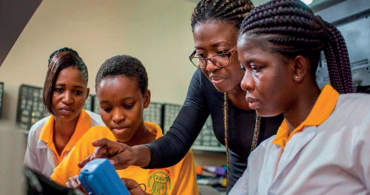UPE SSA 2022

World Summit on the Information Society (WSIS) Forum 2021: Information and Communication Technologies (ICTs) foster inclusive, resilient, sustainable societies and economies Acesso em: 16 jun. 2021.
The COVID-19 pandemic has illustrated two things like never before: firstly, the importance of digital technologies – where would we have been over the last year without mobile phones, radio and television broadcasting, or the Internet? – and secondly, our ever-deepening global interdependence.
Indeed, no one is safe until everyone is safe.
The pandemic has underlined the need to get everyone connected, especially in the rural and remote communities which are most underserved. Digital divides are increasingly apparent between the rich and the poor, urban and rural, and young and elderly, as well as on gender and for persons with disabilities. Investments must be encouraged, both for information and communication technology (ICT) infrastructure and to ensure affordability and digital literacy.
In the face of setbacks, efforts must be redoubled to put the sustainable development agenda back on track. Along with leveraging ICTs to drive sustainable development, governments and other partners can draw on the principles and action lines established by the World Summit on the Information Society (WSIS) back in 2003.
COVID-19 has prompted unprecedented digital infrastructure investment. Countries have expanded their fibre-optic networks, stepped up digital learning, installed free wireless access in health care facilities, and allocated free radio spectrum to help operators meet user needs.
Even so, business continuity has been hard to maintain amid recurring lockdowns. All-pervasive connectivity and new ways of interacting and doing business, including hybrid formats, need to become the norm. Technologies like AI, 5G, and the Internet of Things will be ever-more crucial to meet pressing challenges.
Based on recent experience, countries can now re-think their infrastructure and network designs to prepare for future crises. Teleworking, e-learning, and e-government capacity must be stepped up further. Digital skills gaps, evident in the pandemic, call for more investment in online education.
https://www.itu.int/en/myitu/News/2021/06/14/07/25/WSIS-Forum-2021-ICTs-foster-inclusive-economies-Malcolm-Johnson. Acesso em: 16 jun. 2021.
The sentence "Indeed, no one is safe until everyone is safe" (2nd paragraph) means:
Na verdade, ninguém está seguro neste mundo.
Na verdade, ninguém está seguro até que todos estejam seguros.
Na verdade, não há segurança neste mundo.
Na verdade, todos estão seguros neste mundo.
Na verdade, todos estão inseguros neste mundo.
E mais: nota TRI a todo o momento.





